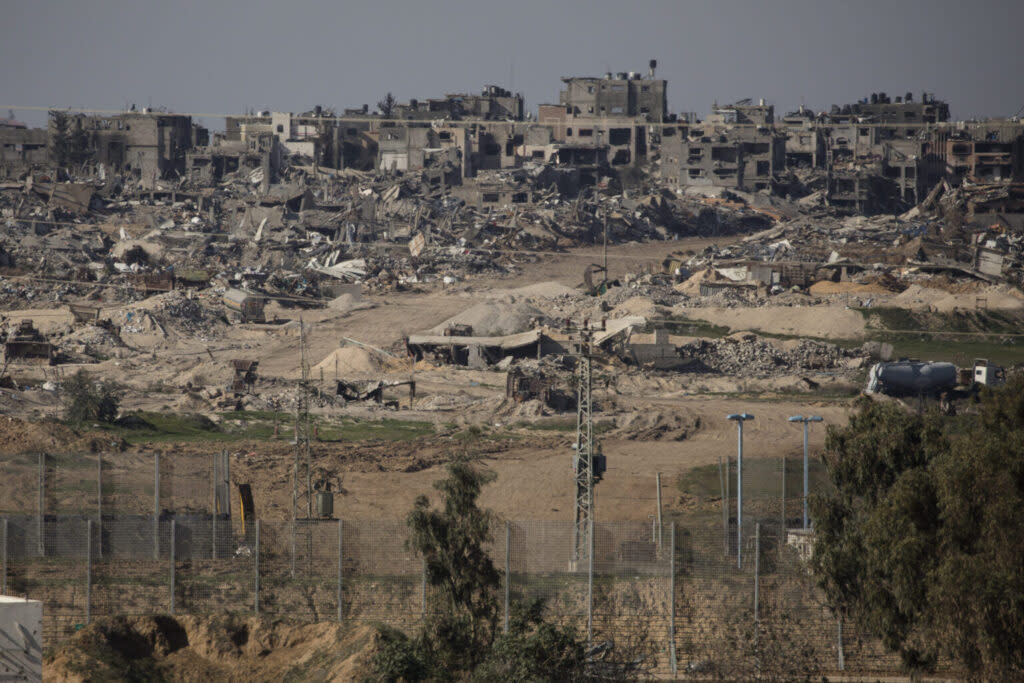Progressive Dems between a rock and a hard place on Gaza

- Oops!Something went wrong.Please try again later.
- Oops!Something went wrong.Please try again later.
The Gaza Strip as seen from the Israeli side of the border. U.S. Rep Mark Pocan and other progressive members of the House of Representatives are asking President Biden to condition recently passed military aid on a guarantee Israel will call off a ground invasion of Rafah and improve the delivery of humanitarian aid.(Photo by Amir Levy/Getty Images)
U.S. Rep. Mark Pocan is still holding out hope that President Joe Biden will pivot to a tougher stance on Israel’s war in Gaza.
Pocan was one of 37 House Democrats who voted against aid to Israel this week in the $95 billion foreign aid package that passed the House and Senate overwhelmingly and which Biden immediately signed.
The progressive U.S. representative from Wisconsin has become a nationally prominent critic of the war — at the same time he is campaigning for Biden’s reelection. That puts him in an awkward place as antiwar protests sweep college campuses and disrupt Democratic campaign events.
There is no question in Pocan’s mind that electing former President Donald Trump would be a disaster for human rights, social justice and the future of U.S. democracy. And he is determined to do what he can to prevent that. But at the same time he has become a champion for progressives who are leaning away from Biden because of the war in Gaza.
U.S. Rep. Mark Pocan speaks to the press in his district office in Madison, Wisconsin on Wednesday, April 24 | Wisconsin Examiner photo
At a hometown press briefing Wednesday in his Madison office, on the very same day Biden signed the foreign aid package, Pocan said he and a group of House colleagues are asking Biden to put conditions on the aid Congress just approved. Biden could hold back offensive weaponry until Israeli Prime Minister Benjamin Nentanyu agrees not to invade Rafah and makes measurable progress on increasing the flow of food, water and medicine into Gaza, Pocan suggested.
Pocan, who said he supports Israel’s Iron Dome missile defense system, just not more offensive weaponry in the midst of the humanitarian crisis in Gaza, is worried about recent news reports that Israel is about to press forward with a ground invasion of the city of Rafah, where about 1.4 million Palestinian refugees are sheltering. Human rights groups project an attack in Rafah could lead to 10,000 to 15,000 more civilian casualties in a war that has already claimed 34,000 civilian lives. Pocan and other progressives held an emergency meeting this week to push the idea, again, that Biden should hold back military support for Israel.
“He’s got so much flexibility on weapons to say none can be used in an invasion of Rafah,” Pocan told reporters. “He’s been very clear; he told them not to do this.”
Of course, Pocan acknowledged, “He also said don’t go back after Iran, and they didn’t listen. He also said we should have a two-state solution and they don’t listen. He’s also said there’s famine, and they ignore that. I am hoping this is one where maybe we can draw the line.”
Earlier in the war, Pocan described Biden as taking a tougher stance with Nentanyahu behind the scenes than he was taking in public. He still describes Biden that way. “The hard part to convey is the president doesn’t wear his foreign policy on his sleeve,” he told reporters Wednesday, suggesting that there is more going on than Biden states publicly.
But lately it seems less like Biden is privately working out a secret plan to end the war and more like, despite his increasingly public frustration with what has become an unsupportable humanitarian disaster, he’s not willing to take the steps to stop it. The more he publicly criticizes what Israel is doing, only to be ignored, the more feckless Biden looks. Upon signing the recent aid package, Biden reiterated that America’s commitment to Israel is “ironclad” and that he would ensure “Israel has what it needs to defend itself against Iran and the terrorists that it supports.”
How concerned is Pocan that Gaza is damaging Biden’s re-electability in Wisconsin?
“I’m concerned,” Pocan said, citing razor-thin margins of victory in a state that is “as purple as you can get.”
When Vice President Kamala Harris visited La Crosse on Monday to campaign on health care access and abortion rights, Pocan said he brought her a copy of the latest Marquette University Law School poll, and highlighted the data on independents who are leaning toward Robert Kennedy, Cornel West and Jill Stein. “It’s more votes than we can afford to be losing,” he said.
From his deep blue district, Pocan is one of the few members of Congress who has been a consistent public critic of AIPAC, the powerful pro-Israel lobby group that has put millions of dollars into primary challenges against progressives including U.S. Reps. Alexandria Ocasio Cortez, Rashida Tlaib, Jamaal Bowman, and Summer Lee.
Pocan regularly calls out AIPAC on social media for its attacks on Democrats, and defends his colleagues who have been accused of antisemitism for criticizing the war. (Pocan does not question Israel’s right to exist, has repeatedly condemned the Oct. 7 Hamas attacks and supports a two-state solution for Israel and Palestine.) “The reason I’m poking the bear,” he told Slate, “is because they’ve become a Trojan bear. AIPAC at least pretended to be bipartisan when I first got [to Congress]. Now they’re basically a wholly-owned subsidiary of the GOP.”
In this and in much of his politics, Pocan is more in tune with young progressives than Biden, whose Israel-right-or-wrong reflexes reflect the views of an older generation. As a Brookings Institution report noted, “Even before the Hamas invasion, there were distinct generational differences in Americans’ attitudes towards Israel. These differences are mirrored by divergences between older and younger Jewish Americans. There are signs that these gaps have widened since the current conflict began.”
Police crackdowns on campus are exacerbating the divide. When Republican House Speaker Mike Johnson went to Columbia University this week to suggest it might be time to call in the National Guard, it was a creepy reminder of the massacre of students protesting the Vietnam war by National Guard troops at Kent State. No doubt Republicans, determined to redirect public outrage from the war to the antiwar protests on campus, would love to see a repeat of the disastrous 1968 Democratic convention in Chicago this year, where police beat up protesters and the war created a giant rift. Chaos, violence and division are the perfect medium for Donald Trump.
But Pocan is less worried about the drag on Biden’s re-election prospects from the college students who cast “uninstructed” votes in the Wisconsin primary than he is about his rural constituents who, he says, are equally upset with Biden over the war.
In his town halls in rural areas of Dane County, Pocan says, “the No. 1 and 2 things people wanted to keep talking about were Ukraine (and we’ve got that done: check) and Gaza.”
“You can’t keep seeing the death toll. You can’t keep seeing famine, you can’t see kids dying with indiscriminate bombing,” he said.
Pocan said he hopes to get video of “people wearing flannel and caps” making this point to share with the Biden campaign. “So they don’t just hear it from me, but they hear it from people in the rural parts of my district.”
“I think Wisconsin still has this antiwar sort of populace going back to Fighting Bob La Follette,” he says.
“I want them to understand,” Pocan says of the Biden campaign and Wisconsin independent voters, “when you see those numbers bleeding off to the left, I think this is a significant part of it.”
At his press briefing, Pocan returned to the talking points Democrats have been putting out since the beginning of the war. On Gaza, he said, “while I know the president is doing more than he’s saying right now, to that end, people don’t know that. And we’ve got to make sure that that gets translated.”
At this point, though, the problem is more than translation. It’s action that’s needed. And to that end, even as the U.S. prepares to send the military aid he voted against to Israel in the midst of a humanitarian catastrophe that is getting even worse, Pocan is pushing as hard as he can to turn the ship.
GET THE MORNING HEADLINES DELIVERED TO YOUR INBOX
The post Progressive Dems between a rock and a hard place on Gaza appeared first on Wisconsin Examiner.


